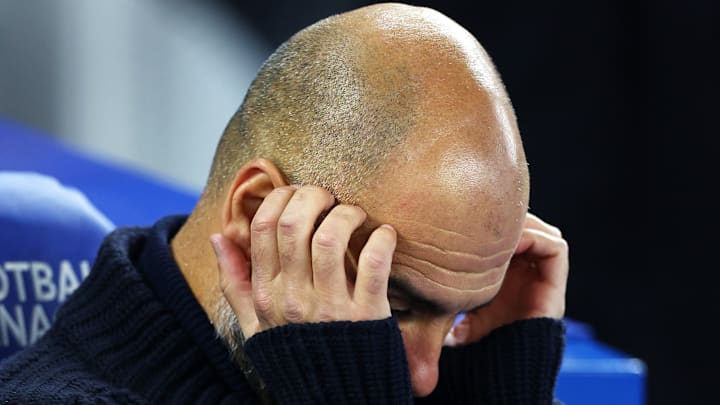Manchester City, led by Spanish coach Pep Guardiola, suffered their fourth consecutive loss and second in the Premier League, after Brighton overturned a one-goal deficit to win 2-1 in the 11th round of the English Premier League.
Erling Haaland put City in the lead with a goal in the 23rd minute, but Brighton responded with two goals in the second half, in the 78th and 83rd minutes, marking Guardiola's first time experiencing four consecutive defeats in his coaching career.
Manchester City appears better under Guardiola… but
Manchester City clearly had the upper hand in the first half under Pep Guardiola's management. The visitors created several dangerous chances on Brighton’s goal, although City’s players squandered these opportunities, with Brighton's goalkeeper Verbruggen making a crucial save from Savinho’s one-on-one attempt.
At the other end, City's defense effectively kept Brighton at bay through well-organized, medium-pressing play, preventing them from getting close to Ederson's goal.
Once City won possession, they quickly countered and aimed to reach Brighton’s goal as fast as possible. This quick transition led to Haaland's goal after Kovacic intercepted the ball and passed it to him. City's speed wasn’t only apparent in counterattacks but also in their organized play toward Brighton’s goal.
However, despite City’s dominance, they abandoned two key characteristics typically seen under Guardiola. The first was high pressing on the opponent. While Brighton excelled in breaking out of pressure, they also made mistakes, but Guardiola chose to pull his team back into a deeper position before pushing forward to close down Brighton.
The second characteristic was City’s overall pace. While speeding up play can be advantageous in certain situations, making it the default strategy throughout the match was unusual for a team coached by Guardiola.
A completely different second half
Surrendering these two key traits may not seem problematic to some, especially if City had held their advantage. But high pressing and controlling the game’s pace are crucial for a team aiming to maintain dominance throughout a match.
The high pace caused City to lose possession more frequently, allowing Brighton longer spells with the ball. Once Brighton began to find gaps in City’s defense, they started to take control. Brighton not only moved easily into the middle of the pitch but also launched repeated dangerous attacks.
Brighton’s advantage in the second half came from two areas: first, dangerous crosses that City's patched-up defense struggled to clear, creating significant pressure on a backline missing Ruben Dias, Manuel Akanji, John Stones, and Nathan Ake.
Secondly, Brighton exploited direct balls into the space behind City's midfield or to forwards Joao Pedro and Danny Welbeck. Coach Holzler's decision to keep the two strikers close together allowed one to escape City's defenders, who were hesitant to step out of position to challenge them.
Highlights from our defeat to Brighton in the @premierleague 📺 pic.twitter.com/IT3a7Rwgug
— Manchester City (@ManCity) November 9, 2024
Pep Guardiola… Welcome to planet Earth!
This fourth consecutive defeat marks a first in Guardiola’s professional career. Those who have watched City from the start of the season will have noticed signs of potential decline in their performance.
Guardiola has experienced defeats before, whether in England or abroad, but he often lost while maintaining his tactical identity, or while his team was the better side. His consistent success and long winning streaks have elevated him to a legendary status, making him seem like a coach from another era, especially in league competitions.
Although Guardiola will likely continue to enjoy great success, periods like these can shake his image and embolden his rivals. This recent string of poor results, coupled with a dip in performance, might cause Guardiola to adjust his tactics. If City’s struggles persist, it may raise questions about Guardiola’s future at the club, though it’s too early to draw any conclusions. For now, we can say: Welcome back to planet Earth, Pep!
